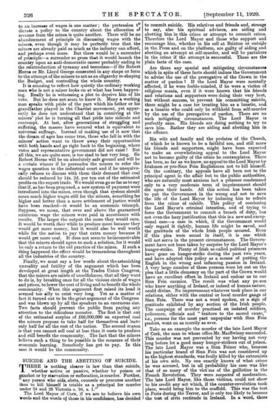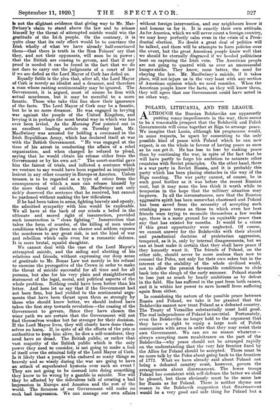SUICIDE AND THE ABETTING OF SUICIDE.
THERE is nothing clearer in law than that suicide, whether active or passive, whether by poison or gunshot or by starvation or suffocation, is murder. Further, " any person who aids, abets, counsels or procures another thus to kill himself is triable as a principal for murder tinder 24 and 25 Victoria c. 94, s. 1." The Lord Mayor of Cork, if we are to believe his own words and the words of those in his confidence, has decided to commit suicide. His relatives and friends and, strange to say, also his spiritual advisers, are aiding and abetting him in this crime or attempt to commit crime. Therefore the Lord Mayor and those who support and encourage him, whether in his cell at Brixton or outside in the Press and on the platform, are guilty of aiding and abetting an attempt at self-murder, and will be partakers in the crime if the attempt is successful. These are the plain facts of the case.
Are there any special and mitigating circumstances which in spite of these facts should induce the Government to advise the use of the prerogative of the Crown in the matter of pardon ? If the Lord Mayor were mentally affected, if he were feeble-minded, if he were a victim of religious mania, even if it were known that his friends and relations and supporters were doing their very best, but without success, to prevent his committing suicide, there might be a case for treating him as a lunatic, and as a lunatic who could only be withheld from self-murder by the use of the prerogative of pardon. There are no such mitigating circumstances. The Lord Mayor is perfectly sane. His friends are doing nothing to try to save him. Rather they are aiding and abetting him in the offence.
His wife and family and the prelates of the Church, of which he is known to be a faithful son, and still more his friends and sup,porters, might have been expected to make an overwhelming appeal to the Lord Mayor not to become guilty of the crime he contemplates. There has been, so far as we know, no appeal to the Lord Mayor by Irishmen or pro-Sinn Fein Englishmen not to kill himself. On the contrary, the appeals have all been not to the principal agent in the affair but to the public authorities, who are naturally most anxious lest a prisoner condemned only to a very moderate term of imprisonment should die upon their hands. All this action has been taken to put the Government in the wrong and not to save the life of the Lord Mayor by inducing him to refrain from the crime of suicide. This policy of condoning the Lord Mayor's criminal intention, and of trying to force the Government to commit a breach of duty, has not even the hazy justification that this is a new and excep- tional case—a case in which, if the Government would only regard it rightly, human life might be saved, and the gratitude of the whole Irish people secured. Even if this plea were sound in itself, it is one which will not serve in the present circumstances. The Govern- ment have not been taken by surprise by the Lord Mayor's hunger-strike. Plenty of Irish so-called political prisoners have gone on hunger-strike during the past two years, and have adopted this policy as a means of putting the English in the wrong and inflaming passion in Ireland. A very large number of these persons were let out on the plea that a little clemency on the part of the Crown would have an excellent effect in Ireland and endear us to our Sinn Fein enemies. The result was what any pe son who knew anything of Ireland, or indeed of human nature, could divine. No improvement whatever took place in our relations, either with the central or local murder gangs of Sinn Fein. There was not a word spoken, or a sign of gratitude exhibited by any section of the Irish people. The campaign of murder practised on isolated soldiers, policemen, officials and " traitors to the sacred cause," i.e., persons for the most part unpopular with Sinn Fein leaders, went on as merrily as ever.
Take as an example the murder of the late Lord Mayor of Cork, the man to whose office Mr. MacSwiney succeeded. This murder was not prevented by our having not very long before let a good many hunger-strikers out of prison. The late Lord Mayor was a Sinn Feiner who, because his particular brand of Sinn Fein was not considered up to the highest standards, was foully killed by the extremists of his own side. No one exactly knows of what crime he was accused, but in all probability his case was like that of so many of the vice ms of the guillotinein the French Revolution. They were suspected of moderation. The late Lord Mayor, like those victims, could not show to his credit any act which, if the counter-revolution took place, would bring him to the scaffold. This was the test in Paris during the Terror, and is only too likely to become the test of civic rectitude in Ireland. In a word, there is not the evidence that giving way to Mr. Mac- Swiney's claim to stand above the law and to release himself by the threat of attempted suicide would win the gratitude of the Irish people. On the contrary, it is quite clear that its only effect would be to convince the Irish wholly of what we have already half-convinced them—that there is truth in the Sinn Feiners' cry that they, and not their opponents, will soon be in power ; that the British are ceasing to govern, and that if any proof is needed it can be found in the fact that we do not dare to carry out the judgments of a court of law if we are defied as the Lord Mayor of Cork has defied us. Equally futile is the plea that, after all, the Lord Mayor of Cork is merely an idealist and a dreamer, and therefore a man whose ranting sentimentality may be ignored. The Government, it is argued, must of course be firm with actual murderers, but it may be merciful to a mere fanatic. Those who take this line show their ignorance of the facts. The Lord Mayor of Cork may be a fanatic, but he is no mere dreamer. He was engaged in levying war against the people of the United. Kingdom, and levying it in perhaps the most brutal way in which war has ever been levied. As the Morning. Post pointed out in an excellent leading article on Tuesday last, Mr. MacSwiney was arrested for holding a command in the Irish Republican Army, which has declared itself at war with the British Government. " He was engaged at the time of his arrest in conducting the affairs of a rebel organization, and when charged he refused to plead, saying that he would obtain his release either from the Government or by his own act." The court-martial gave him the fairest of trials, and inflicted a sentence which we venture to say would have been regarded as impossibly lenient in any other country in Europe or America. Unless treason is to be regarded as a type of crime from the consequences of which a man can release himself by the mere threat of suicide, Mr. MacSwiney not only richly deserved the sentence that he received, but cannot be pardoned without making the law ridiculous. If he had been taken in arms, fighting bravely and openly, the admitted sympathy with him would be explicable. We all have at the back of our minds a belief in the ultimate and sacred right of insurrection, provided such insurrection is " clean fighting." Insurrection that takes the form of murder, of the killing of men under conditions which give them no chance and seldom exposes the murderers to any great risk, is not the kind of war and rebellion which calls even for a romantic defence. It is mere brutal, squalid. slaughter.
We cannot deal with the case of the Lord Mayor's attempted suicide, and the aiding and abetting of his relations and friends, without expressing our deep sense of gratitude to Mr. Bonar Law not merely in his refusal to exercise the prerogative of the Crown in order to make the threat of suicide successful for all time and for all persons, but also for his very plain and straightforward. statement of the legal, moral, and political aspects of the whole problem. Nothing could have been better than his letter. And here let us say that if the Government had not been firm, but had yielded to the sentimental argu- ments that have been thrust upon them so strongly by those who should know better, we should indeed have taken the first step towards revolution—the ceasing of the Government to govern. Since they have chosen the wiser path we are certain that the Government will not find themselves weaker but far stronger for their decision. If the Lord Mayor lives, they will clearly have done them- selves no harm. If, in spite of all the efforts of the pris in authorities to keep him alive, he dies a self-murderer, they need. have no dread. The British public, or rather that vast majority of the British public which is the only power they need to consider, is not going to make a fool of itself over the criminal folly of the Lord Mayor of Cork. Is it likely that a people who endured so many things so bravely and so wisely during the war are going to have an attack of superheated hysteria over such an event ? They are not going to be coerced into doing something they know to be wrong by a gamble in suicide. Nor will they be affected. by the ridiculous talk of creating a bad impression in Europe and America and the rest of the world. The firmness of our Government will make no such bad impression. We can manage our own affairs without foreign intervention, and our neighbours know it and honour us for it. It is exactly their own attitude. As for America, which we will never count a foreign country, we may keep perfectly calm even in the crisis of a Presi- dential election. No doubt a great deal of politics will be talked, and there will be attempts to form policies over the event, but the great American people know well that we should be eternally disgraced if we heeded politician. bent on capturing the Irish vote. The American people are not going to quarrel with us over an unsuccessful hunger-strike. They know, none better, the need for obeying the law. Mr. MacSwiney's suicide, if it takes place, will not injure us in the very least with any section of American opinion which we need consider. When the American people know the facts, as they will know them, they will agree that our Government could have acted in no other way.



































 Previous page
Previous page